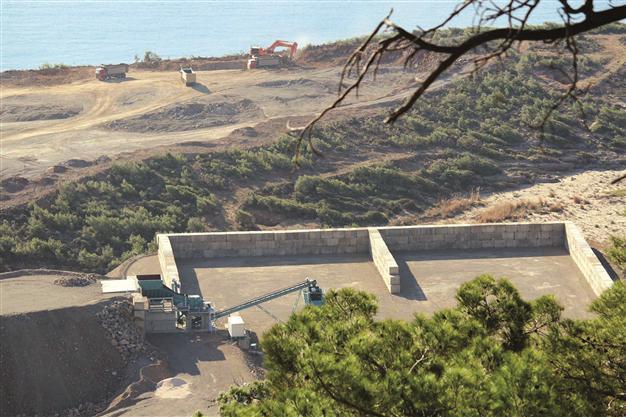Turkey’s first nuke plant ‘facing further delays’
ANKARA/ISTANBUL - Reuters

Photos and video footage of the Akkuyu nuclear plant construction site were released by Greenpeace. Akkuyu CEO Alexander Superfin has said the company will submit a revised environmental impact report by the end of this month. DHA photo
Turkey’s first nuclear power plant has hit further delays that will push back the start of production by almost a year after Turkish authorities requested resubmission of an environmental report, industry sources and experts said.
Russia’s Rosatom is building the first four nuclear reactors for energy-hungry Turkey, which has embarked on an ambitious nuclear program led by the government, to reduce its $60 billion annual energy import bill.
The CEO of Akkuyu NGS, the project company set up by Russia’s Rosatom, said in October that the project was going to be operational by mid-2020, a delay of about 18 months from the initial start-up date.
However now, even that schedule looks to be too optimistic, with energy officials and experts predicting a further delay of 10-12 months.
“When you look at the current picture, whatever the reasons are, there is a good chance the delay could be around 10 months. Both the Energy Ministry and Akkuyu NGS are working to avoid this,” an energy official said.
Turkish authorities have recently asked Rosatom to review and resubmit a key environmental report, saying the previous two submissions have not met its criteria. The report was first sent to the Environment Ministry last June.
“Mid-2020 is still very fast,” Aaron Stein, associate fellow at British defense and security think-tank the Royal United Services Institute said. “In order for a reactor to be on track, everybody should be moving at the same speed. These hiccups and delays are a sign of project disorganization.”
Only after the approval can Atomstroyexport, the main contractor chosen by Rosatom to build the reactors, obtain a construction license for the Mersin Akkuyu plant in southern Turkey, launch tenders for an estimated $7.5-8.0 billion worth of subcontracts and start the construction in early 2016.
“We are planning to submit the revised report by the end of this month and expect a positive decision on it by April,” Akkuyu CEO Alexander Superfin told Reuters via email. “As everybody knows, we can’t start the construction without the environmental green light.”
Taek tendersA major reason for the hold-up of the project is the lack of an eligible company to review and assess Rosatom’s reactor plans to ensure the design meets safety standards.
A tender by the Turkish Atomic Energy Authority (TAEK) to pick a firm to carry out this work has been cancelled at least three times after bidders failed to meet the pre-qualification criteria.
One energy official said regulatory changes have been made to facilitate TAEK’s tendering process and a new tender will be issued very soon. He did not give a specific time frame.
Turkey’s power market looks to be alone in Europe in offering promising returns. Electricity consumption rose 5 percent to 242 billion kilowatt hours (kWh) in 2012 and energy demand growth forecasts are second only to those of China.
Turkey needs to add some 3,500 MW of installed power capacity annually to keep pace. Its second planned nuclear plant was awarded last May to a Japanese-French consortium.
Japan’s Mitsubishi Heavy Industries Ltd and Itochu Corporation, with France’s GDF Suez, will build the 4,800 MW plant at an estimated cost of $22 billion in the Black Sea coastal city of Sinop.
Industry sources have said the first reactor at that plant is slated to come online by 2023, but experts also see that schedule as too optimistic.
